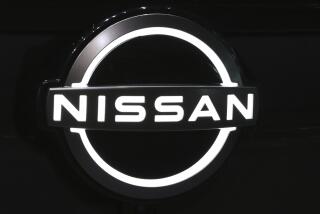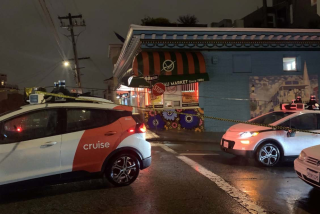Samurai Bounces Back in Wake of U.S. Decision
- Share via
Susan Gordon, a former Los Angeles nurse who bought her blue Suzuki Samurai secondhand in June after a close friend became nervous about a consumer group’s claim that the vehicle was prone to tip over, feels vindicated following the government’s decision not to open a probe of the sport utility vehicle.
“At first I thought I made a big mistake buying it,” said Gordon, who does consulting work. “My parents were making fun of me, saying that I could get hurt. But it’s never come close to tipping over. They’re (Suzukis)) really fun. My only regret now is that I didn’t buy a new one.”
Sales of the Suzuki had fallen 71% in June to 2,199 following the critical June report by Consumers Union, publisher of Consumer Reports magazine. The influential Mt. Vernon, N.Y.-based watchdog group said the vehicle’s center of gravity was too high, making it prone to tip over when the driver swerved sharply.
But last week, the National Highway Traffic Safety Administration denied a petition by the Center for Auto Safetey--a Washington-based consumer group founded by Ralph Nader--calling on the government to recall the Suzuki Samurai. Officials of Brea-based American Suzuki Motor Corp. say their aggressive, high-profile response to Consumers Union and the Center for Auto Safety paid off.
“The public has not accepted the validity of the (Consumer Reports) testing and wisely so,” said Douglas Mazza, vice president and general manager of American Suzuki Motor. “We made a quick response in getting the right information in the hands of dealers and consumers.”
Despite rejecting the Center’s petition, NHTSA, an arm of the Transportation Department, did agree to conduct a general study of the roll-over problem in all vehicles--a move that could eventually result in a new standard for vehicle roll-overs.
In the wake of the agency’s decision, American Suzuki Co. announced Tuesday that sales of its small, jeep-like Samurai in August reached a one-month record 12,208. The record sales were primarily the result of a summer-long promotion that made it possible for dealers to slash 25% from the Samurai’s $7,995 base price. But many consumers, such as Gordon, never were very concerned about the alleged safety questions.
“It (Suzuki) is basically like a jeep and you have to drive it like a jeep,” said James Contreras, a 23-year-old Samurai owner who works for a collection agency in Arcadia. “It’s not a sports car like my Datsun 240Z.”
Contreras said that last summer he and a friend became involved in a car chase over rough roads in central Mexico and did not experience any handling problems. “I took the car to the limit and we made it out OK.”
Some Suzuki dealers say they welcome a study of a roll-over standard.
“I talk to dealers all over the country,” said Bob Eherenfeldt, owner of Suzuki Automotive in San Diego and co-chairman of the Suzuki National Dealer Council. “Anytime something comes up that raises a safety question they want to get to the bottom of it.”
Strategy ‘Unchanged’
American Suzuki produced its own tests and statistical evidence to back up its claim that the Samurai was safe, and on July 13 announced its $2,000 incentive plan to dealers. Sales of the four-wheel-drive vehicle rose to 6,327 in July.
“Our strategy has really been unchanged throughout all of this,” said Leonard Pearlstein, president of Suzuki’s Los Angeles-based advertising firm, Keye/Donna/Pearlstein. “I think the government did our advertising for us by setting the record straight. It’s been a terrific endorsement of what we’ve been saying all along.”
The Center for Auto Safety, which says it will appeal NHTSA’s decision, harshly criticized the agency. “If this were the law, then the Justice Department would refuse to prosecute one mass murderer because there are other mass murderers,” the Center said, citing reports of 113 roll-overs, 120 injuries and 25 deaths involving the Samurai.






